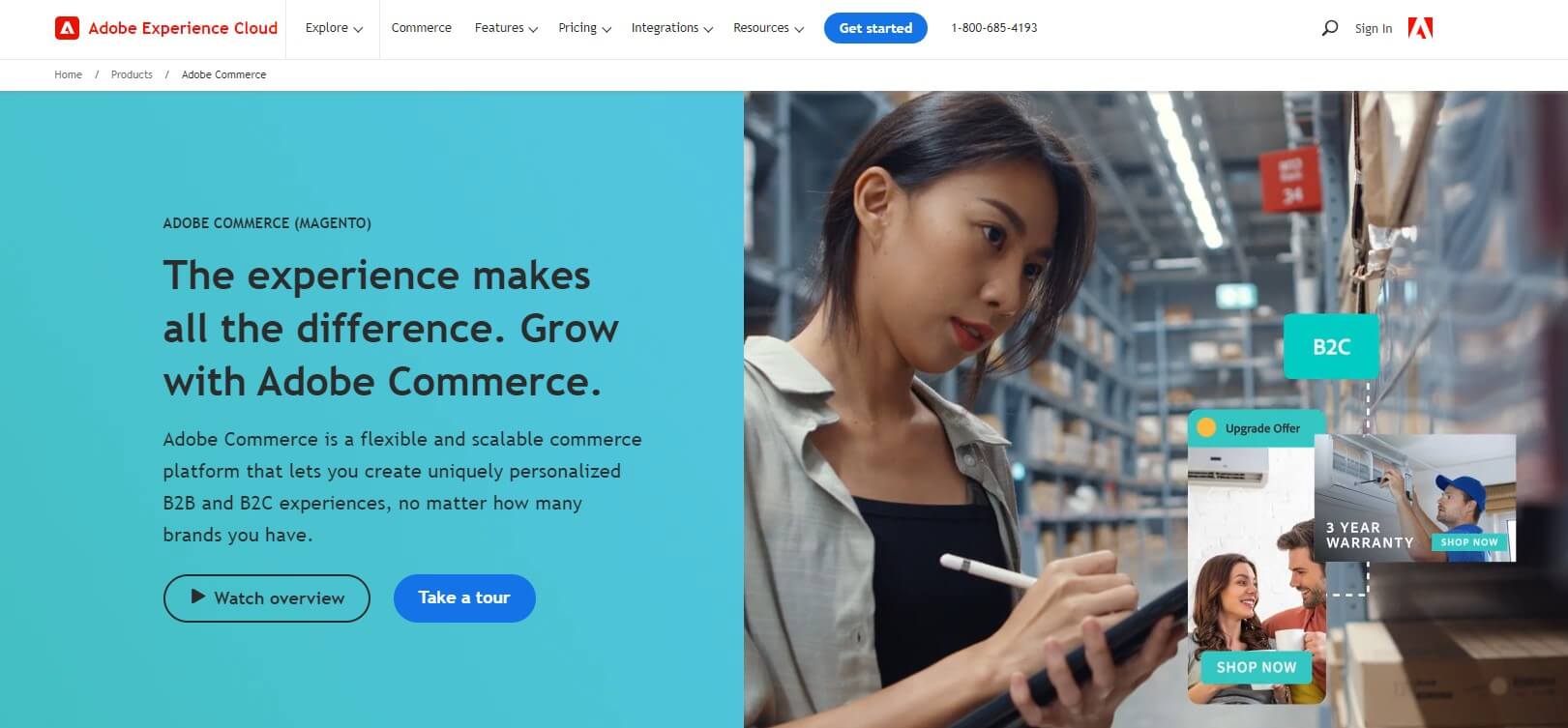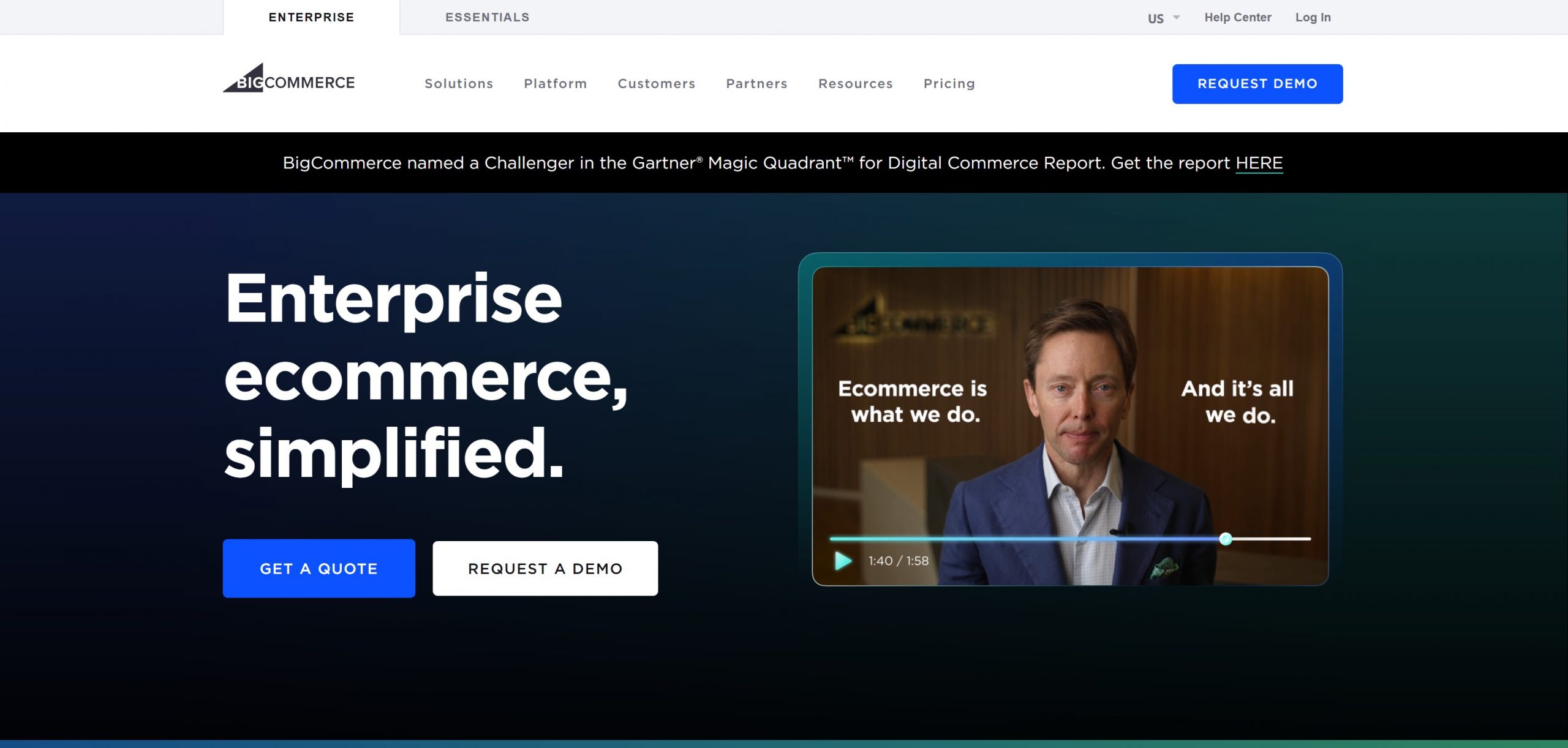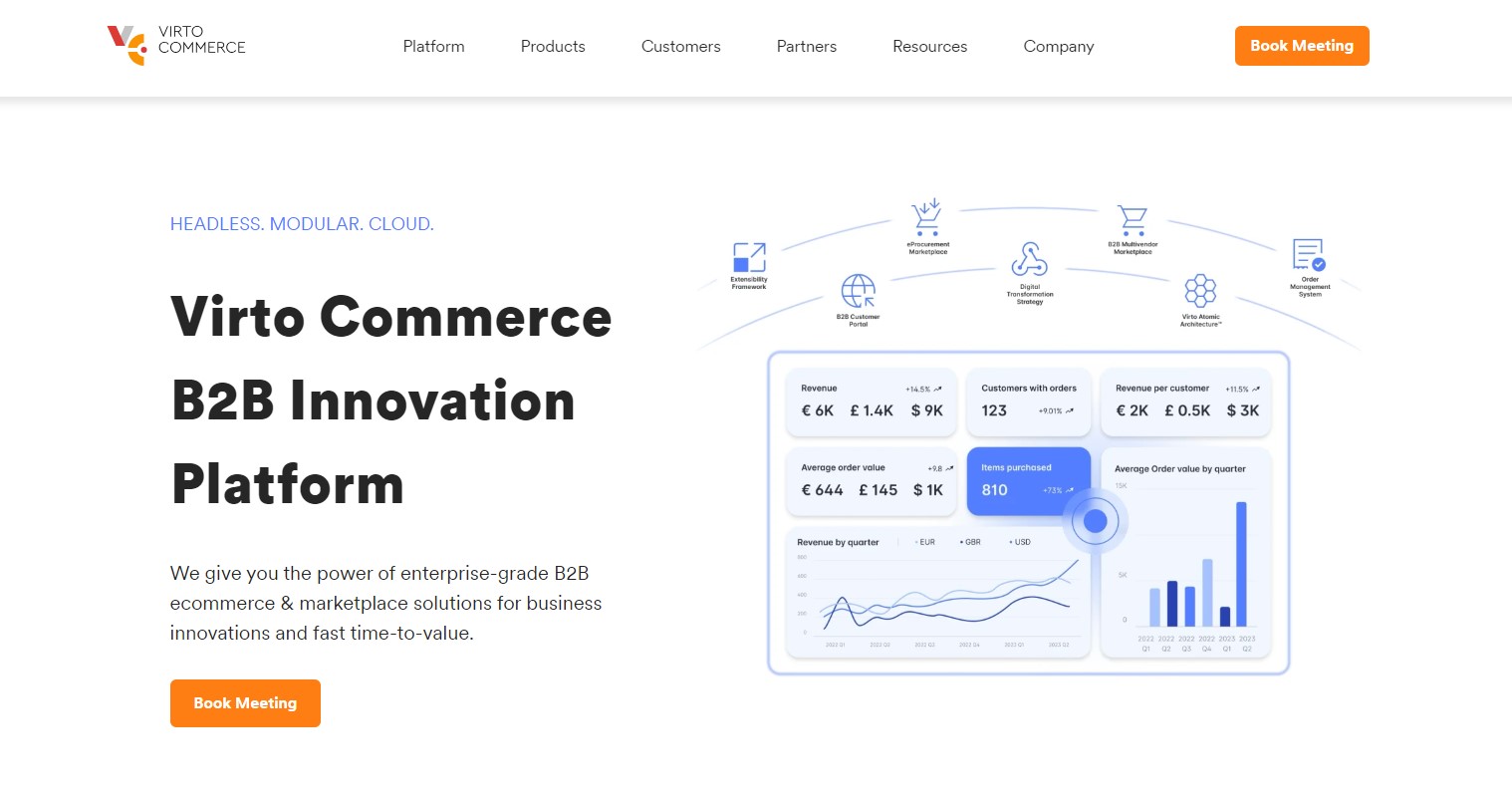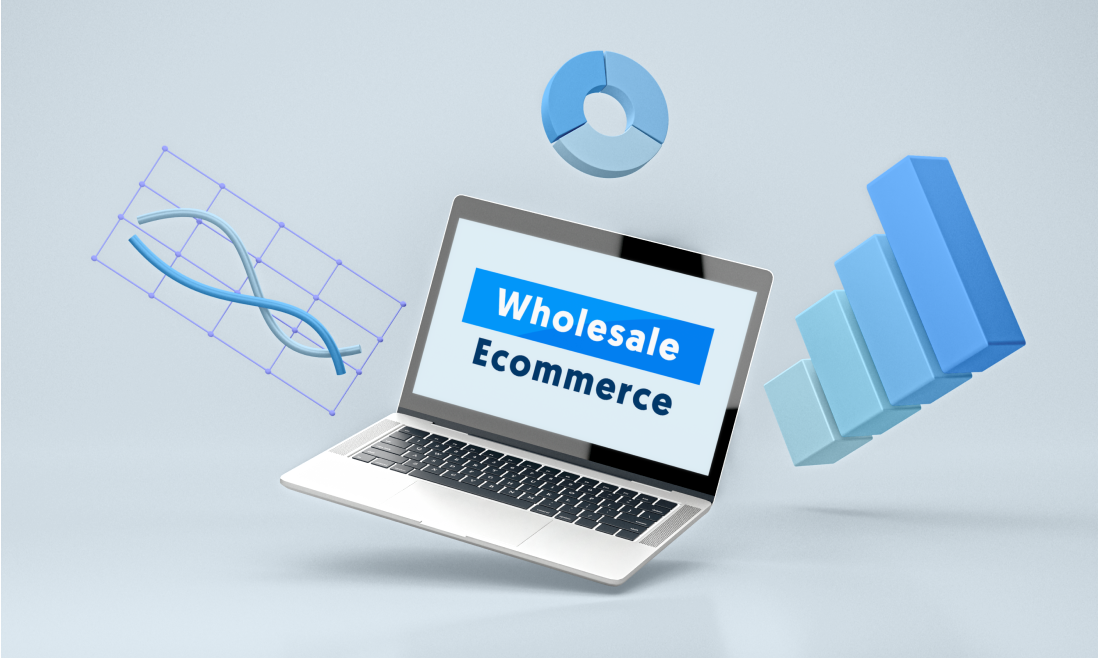Finding the right platform to sell your wholesale products can be a game-changer.
Are you a business owner or manager looking to dive into the world of wholesale ecommerce? You’re in the right place!
In 2024, the choices are more exciting than ever, with platforms offering a wide range of features to meet every need. From managing massive inventories to creating personalized shopping experiences for your buyers, these platforms have got you covered.
In this blog post, we’re going to explore the top 9 best wholesale ecommerce platforms of 2024. Whether you’re just starting out or looking to upgrade your current setup, you’ll find valuable insights to help you make the best choice for your business. So, let’s get started!
Top 9 Best Wholesale Ecommerce Platforms
#1. Adobe Commerce

Adobe Commerce is a robust e-commerce platform designed for businesses of all sizes, especially those in wholesale or B2B. It’s known for its ability to handle the complex needs of selling products in large quantities. There are two versions of Adobe Commerce:
- Magento Open Source: This version is free and lets you host the platform yourself. It offers lots of control but needs more technical work to set up and keep running.
- Adobe Commerce Cloud: Adobe hosts this version, making sure it’s always up to date and running smoothly. It’s easier to manage but comes with a cost.
Pros
- Scalability: Adobe Commerce can handle a growing number of orders, products, and customers without a hitch.
- Integrations: You can link Adobe Commerce with your other business systems for smoother operations.
- Customization: Thanks to its open-source nature and a wide range of add-ons, you can tweak the platform to fit your exact needs.
- In-depth Reports: The platform offers powerful tools to analyze and improve your sales and operations.
Cons
- Cost: The Cloud version of Adobe Commerce can be pricey compared to simpler options.
- Technical Needs: Setting up and maintaining the platform usually requires help from experts.
- Learning Curve: It might take some time to learn how to use all the features Adobe Commerce offers.
Adobe Commerce is ideal if:
- You have a medium to large business that deals with complex product lists and pricing.
- Customization and smooth integration with other systems are crucial for you.
- You’re planning to grow your business and need a platform that can grow with you.
- You have the budget and technical resources to set up and maintain the platform, or you’re willing to work with a partner who can help.
#2. Shopify

Shopify is a popular e-commerce platform known for its ease of use and versatility. While its core focus is direct-to-consumer (DTC) retail, it offers solutions to help you expand into wholesale operations:
- Shopify Wholesale Channel: This is a built-in feature designed to create a separate, password-protected storefront specifically for your wholesale customers.
- Shopify Plus: The enterprise-level version of Shopify, offering more advanced features suitable for larger wholesale operations.
- Wholesale Apps: There’s a robust marketplace of third-party Shopify apps that extend your store’s wholesale functionality.
Pros
- Ease of Use: Shopify is known for its user-friendly interface, making it a good option for businesses wanting a less complex wholesale solution.
- Cost-Effectiveness: Shopify can be a more affordable choice compared to platforms like Adobe Commerce, especially for smaller wholesalers.
- App Ecosystem: Access to dedicated wholesale apps lets you add features as needed.
- DTC & Wholesale Hybrid: Easily operate both retail and wholesale storefronts in parallel.
Cons
- Feature Limitations: Shopify’s built-in wholesale functionality might be less extensive when compared to platforms specifically designed for B2B. Complex wholesale workflows may require supplementing with apps.
- Scalability: For very large-scale B2B businesses, Shopify Plus might still have some limitations, especially regarding deep customization.
Shopify can be a great fit if:
- You’re a small to medium-sized wholesaler looking for a simpler, budget-friendly solution.
- You need basic wholesale functionality like tiered pricing, minimum orders, and streamlined the order process.
- You want a platform that’s easy to set up and manage.
- You want the flexibility of integrating specific wholesale features using apps.
#3. BigCommerce

BigCommerce takes a balanced approach to wholesale e-commerce. It provides a strong foundation of built-in B2B features, along with the flexibility to customize further for complex wholesale needs. This makes it a suitable option for a wide range of wholesalers.
Pros
- Robust Built-in Features: BigCommerce offers more comprehensive native wholesale features out-of-the-box than Shopify.
- Scalability: Handles large catalogs, complex pricing, and high order volumes with ease, supporting your growth.
- Customization: Provides customization options through APIs and a selection of apps, allowing for tailored workflows.
- Ease of Use: BigCommerce is known for its relatively user-friendly and intuitive backend.
- Value: Strikes a good balance between features and affordability compared to some enterprise-level platforms.
Cons
- Advanced Needs: For extremely complex or niche wholesale requirements, BigCommerce still might require some customization or apps, potentially on par with Adobe Commerce.
BigCommerce is a solid choice if:
- You’re a medium to large-sized wholesaler seeking robust native B2B features.
- You want a scalable platform that can grow with your wholesale operations.
- You potentially need some customization but don’t want the complexity associated with a fully open-source platform.
- You value a user-friendly backend experience.
#4. WooCommerce

WooCommerce is a popular, open-source e-commerce plugin for WordPress. It’s known for its flexibility and vast customization potential. However, setting up wholesale functionality on WooCommerce requires a combination of the core platform and specialized plugins/extensions.
Pros
- High Customization: WooCommerce’s open-source nature gives you extensive freedom to tailor your store to your exact wholesale needs.
- Affordability: The core WooCommerce plugin is free, and you can selectively purchase wholesale plugins, making it a potentially cost-effective solution.
- WordPress Integration: Seamlessly integrates with your existing WordPress website and leverages a massive library of plugins and themes for additional functionality.
- Large Community: Access a wide community of developers and resources for support and custom solutions.
Cons
- Technical Complexity: Setting up and maintaining a WooCommerce wholesale site often requires development expertise or working with a WooCommerce agency.
- Plugin Dependency: Core WooCommerce lacks built-in wholesale features, so you’ll rely on third-party plugins, which can add to costs and complexity.
- Scalability: While WooCommerce can handle a good degree of growth, very large-scale operations might be better served by platforms built with enterprise-level B2B needs in mind.
WooCommerce can be a great fit if:
- You need a highly customized wholesale solution and have the technical resources (or are ready to partner with an agency) to build it.
- You prioritize flexibility and full control over your store’s functionality.
- You want a cost-effective wholesale solution.
- You are already using WordPress and want to integrate your e-commerce operations.
#5. NetSuite

NetSuite is an enterprise resource planning (ERP) system with robust e-commerce capabilities, making it a comprehensive solution for managing both back-office operations and your online wholesale presence. NetSuite offers various modules and solutions tailored specifically for wholesale distributors.
Pros
- Unified Platform: Eliminate data silos and streamline processes by managing your entire wholesale operation within a single system.
- Scalability: Designed to handle large-scale operations, complex product catalogs, and high order volumes.
- Global Reach: Supports multi-currency, multi-language, and tax compliance across various markets for international wholesale.
- Deep Customization: NetSuite’s SuiteScript allows for extensive tailoring to fit even the most unique wholesale workflows.
- Reliability: NetSuite offers high uptime and robust security as a cloud-based solution.
Cons
- Cost: NetSuite is typically a higher investment compared to other options, especially for smaller wholesalers.
- Implementation Complexity: Setting up NetSuite often requires specialized expertise and may involve a longer implementation period.
- Steep Learning Curve: NetSuite can have a steeper learning curve for users due to its breadth and depth of features.
NetSuite is a powerful choice if:
- You’re a medium to large-sized wholesaler with extensive and potentially complex needs.
- You prioritize a fully integrated system linking your e-commerce with inventory, accounting, CRM, and all other business aspects.
- You seek a highly customizable solution that can adapt to your unique workflows and processes.
- You’re ready to invest in a long-term, scalable platform to support business growth.
#6. OroCommerce

OroCommerce stands out as a platform specifically designed for the complex demands of B2B and wholesale e-commerce. It offers a comprehensive suite of features and flexibility, ideal for mid-sized to enterprise-level wholesalers.
Pros
- B2B Focus: The platform is built from the ground up for B2B needs, offering specialized features often lacking in general-purpose e-commerce platforms.
- Scalability: Handles large catalogs, complex pricing structures, and high order volumes while accommodating business growth.
- Customization & Open-Source: Offers flexibility to tailor the platform to even the most specialized wholesale workflows (especially with the open-source version).
- Community & Marketplace: Benefit from a dedicated community of developers, extensions, and resources focused on B2B e-commerce.
Cons
- Technical Expertise: OroCommerce, particularly the open-source version, often requires development experience for implementation and customization.
- Potential Costs: While the open-source version is free, customizations, integrations, and support can lead to significant costs.
OroCommerce is an excellent fit if:
- You’re a medium to large-scale wholesaler with a complex B2B sales structure.
- You prioritize deep B2B functionality in your e-commerce platform.
- You need significant customization capabilities to align your store with unique workflows and buyer requirements.
- You have the technical resources or are willing to work with an OroCommerce solution partner.
#7. Shift4Shop (3dCart)

Shift4Shop provides a solid foundation for wholesale e-commerce, along with some useful tools and the potential for customization. It can be a good fit for small to medium-sized businesses looking for a cost-effective and relatively easy-to-use solution.
Pros
- Affordability: Shift4Shop offers competitive pricing plans, especially if you use Shift4 Payments as your payment processor (in which case the core platform is free).
- Ease of Use: Shift4Shop has a relatively user-friendly backend compared to more complex solutions.
- Built-in Features: Many of the essential wholesale features are present natively, potentially reducing the need for third-party apps.
- End-to-End Plan: Includes payment processing with Shift4 as the gateway through their “End-to-End” plan.
Cons
- Feature Depth: While Shift4Shop covers the basics, its wholesale capabilities aren’t as extensive as platforms purpose-built for B2B, especially regarding advanced pricing rules or quote management.
- Customization Limitations: Options for tailoring the platform are more limited when compared to highly customizable solutions like Adobe Commerce or OroCommerce.
- Paid Support: While some support is included, more advanced customer care may involve additional paid support packages.
Shift4Shop might be a good choice if:
- You’re a small to medium-sized wholesaler with fairly straightforward wholesale needs.
- You prioritize cost-effectiveness and a streamlined setup.
- You don’t require extremely complex pricing structures, quote management, or intricate workflows.
- You plan to use Shift4 Payments as your payment gateway.
#8. PrestaShop

PrestaShop is a free, open-source e-commerce platform known for its flexibility. While it doesn’t have a comprehensive set of built-in wholesale features, it offers a significant advantage: a robust marketplace of add-ons (modules) that enhance its functionality.
Pros
- Cost-Effective: The core PrestaShop platform is free, and you can selectively purchase add-ons based on your specific needs.
- Customization: PrestaShop’s open-source nature allows for tailoring to your liking, especially when combined with add-ons.
- Community: Access a large community of users and developers for support and custom solutions.
Cons
- Add-on Dependence: Building a viable wholesale solution relies heavily on selecting the right add-ons, which can add to complexity and costs
- Technical Expertise: Setting up and maintaining a PrestaShop wholesale site often requires development knowledge, especially for customization.
- Limited Built-in Features: The core platform lacks specialized B2B functionality compared to platforms designed with wholesale in mind.
PrestaShop could be suitable if:
- You’re a tech-savvy, small to medium-sized wholesaler looking for a budget-conscious and customizable platform.
- You’re comfortable managing a solution that relies on add-ons and are willing to invest time in setup.
- You need flexibility to tailor the system to your specific wholesale requirements.
#9. Virto Commerce

Virto Commerce is an open-source, .NET-based e-commerce platform designed with the complexities of B2B and wholesale operations at its core. It offers flexibility, scalability, and a comprehensive suite of features for successful wholesale businesses.
Pros
- B2B Centric: The platform is built from the ground up for the unique demands of wholesale and B2B e-commerce.
- Scalability: Handles extensive product catalogs, high order volumes, and complex business requirements, supporting long-term growth.
- Flexibility & Customization: The open-source nature and modern headless architecture offer unparalleled flexibility to tailor the platform to your exact workflows and processes.
- Speed to Market: Virto Commerce’s foundation lets you launch and iterate on your wholesale store quickly.
- Active Community: Benefit from a dedicated community and partner network specializing in B2B e-commerce.
Cons
- Technical Expertise: While Virto Commerce has tools for streamlining setup, it generally requires development resources for implementation, customization, and maintenance.
- Cost: While the platform itself is open-source, customizations and the ongoing support of developers can represent a significant investment.
Virto Commerce is an excellent fit if:
- You’re a medium to large-sized wholesaler with potentially complex B2B requirements.
- You prioritize extensive B2B functionality, scalability, and a highly customizable platform.
- You need deep integration with other business systems for a centralized view of operations.
- You have the technical resources readily available or are ready to partner with a Virto Commerce solution provider.
How to Choose A Wholesale Ecommerce Platform

When selecting the appropriate wholesale e-commerce platforms for your business, several factors need evaluating. Pricing, features and functionalities, ease of use, inventory management, and multichannel selling are the most crucial considerations.
1. Pricing
The ultimate goal of every business is profit, so your web builder should not ask for a service price greater than the potential profit it can bring for you in the future.
Therefore, in order to find a good wholesale eCommerce platform, you shouldn’t simply compare their service plan costs. remember to evaluate its profitability as well. Even if you have to spend a large amount of money now, as long as you can earn three times the same profit in the future, it is still fine.
2. Ease of use
In the above, we talked about why an eStore should have an easy-to-use storefront. In fact, its backend should also be as user-friendly as possible since you will have to constantly work with it.
So look for a place that can bring you a straightforward user interface and an adaptable admin panel. Only choose your desired wholesale b2b platform when it can fulfill both of these requirements.
Please note that your eCommerce site’s backend should be easy to use but your web-building platform is not necessarily easy to use. The more technical knowledge your platform requires to use, the greater the flexibility your platform is.
3. Features and functionality
The next thing to keep in mind is of course the platform’s functionality. This is the most obvious manifestation of your web builder’s capabilities. In our point of view, your final choice should provide functions like bulk selling, inventory management, marketing, and data storage at least.
Try to look for a unit that offers as many features as possible at a reasonable price. However, don’t forget to read the functionality of these features carefully because we believe you won’t want to pay for something you never use!

4. Inventory management
This is one of the most important features for B2B merchants as their warehouses are often huge. Your wholesale eCommerce platform should be able to support your inventory management process.
For example, the number of goods while should decrease as your customer makes a purchase. This number should also automatically increase again if the order is not successful (although we do not want this).
If your companion cannot meet this minimum condition, no matter how suitable it is for your business, switch platforms as soon as possible.
5. Multichannel selling
Investing in a platform capable of supporting omnichannel and providing a consistent user experience would be a great idea. Today, your customers are not only buying through their desktops or laptops, they also buy using their phones, tablets, or even smart TVs.
Therefore, it would help if you were able to deliver an optimal and consistent experience for your customers across all these channels.
FAQ
Which platform is best for wholesale business?
The best wholesale e-commerce platform varies by business needs. Adobe Commerce is highly favored for its scalability, customization, and robust features tailored for B2B and wholesale operations. It suits medium to large businesses seeking extensive integration and growth capabilities.
What is the best website builder for wholesale business?
For wholesale businesses, Shopify Plus stands out as a top website builder. It offers scalable solutions, advanced wholesale channels, and customization options tailored for high-volume merchants. Shopify Plus facilitates seamless integration with various sales and marketing tools.
Does Shopify have a wholesale platform?
Shopify offers a wholesale platform through Shopify Plus. This enhanced version of Shopify provides a dedicated wholesale channel, allowing businesses to create a customizable, private storefront for their wholesale customers, complete with tailored pricing and bulk ordering options.

